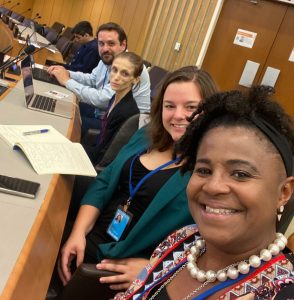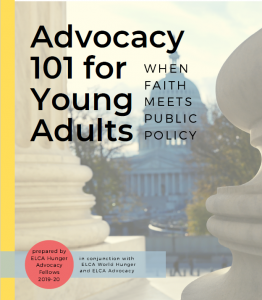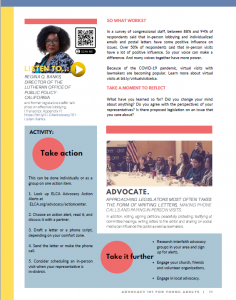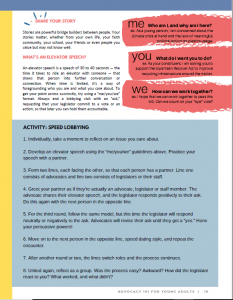ELCA World Hunger’s 40 Days of Giving
Lent 2022
In English and en Espanol

Week 5: A Way in the Wilderness
“Do you not perceive it?” (Isaiah 43:19)
Read
- Isaiah 43:16-21
- Psalm 126
- Philippians 3:4b-14
- John 12:1-8
Reflect
Each of the sessions of this Lenten study has been grounded in a verse from this week’s readings:
I am about to do a new thing; now it springs forth, do you not perceive it? I will make a way in the wilderness and rivers in the desert (Isaiah 43:19).
From the first-fruits offering of Deuteronomy to the teaching of Jesus in the Gospel of Luke, our reflections have pointed to how God continues to “make a way in the wilderness” and calls us to be part of that journey for ourselves and our neighbors. The Scripture readings this season remind us of the promise of new life in Canaan for our ancestors and new life in Christ for us all.
We have imagined a world without hunger, heard of God’s abundant provision of manna and seen the ways the church has worked tirelessly, in the past and today, to end hunger.
Now we reach the culmination of this movement toward the fulfillment of God’s promise, wherein Jesus announces: “You will always have the poor among you” (John 12:8 NIV).
It’s not the most encouraging verse in the Bible.
How often have people twisted these words into an excuse for passivity or a sneering retort to proclamations of hope that hunger and poverty can, one day, end? Along with its partner in 2 Thessalonians (“Anyone unwilling to work should not eat”), it’s one of the “hard passages” for people of faith eager to inspire others to respond to hunger and poverty. These troublesome verses are often used to support restrictive, counterintuitive policies and practices that inhibit real progress against hunger and poverty. Why try harder to end hunger and poverty if even Jesus says poverty isn’t going away?
The passage yields more when we dig a little deeper. Jesus may actually be referring to an earlier part of the Bible here, and in that earlier verse the words are no statement of fact but a challenge to the people of God. The verse appears in a section of Deuteronomy about the Jubilee Year, a time every seven years when debts were forgiven. That earlier passage sheds new light on the verse from John:
Since there will never cease to be some in need on the earth, I therefore command you, “Open your hand to the poor and needy neighbor in your land” (Deuteronomy 15:11).
Far from resigning us to poverty in the world, the verse challenges followers of Christ. In his commentary on Deuteronomy, Martin Luther writes, “‘The poor you always have with you,’ just as you will have all other evils. But constant care should be taken that, since these evils are always in evidence, they are always opposed.”
For Luther, to “always have the poor among you” meant to be confronted always by God’s call to respond to human suffering and oppose the evil that creates it. This is not resignation but activation of the people of God in the service of the neighbor.
What’s more, we may find in Jesus’ words a lesson for our identity as church together. “You will always have the poor among you.” If we are truly the
people of God, then we are called to be in community with neighbors who have been marginalized, excluded, oppressed and impoverished by the world’s injustice.
As church, our calling is not merely to minister to our neighbors but to bear witness to the “new thing” God is doing in our world, a new community God is making possible. This is not easy work. Confronting hunger and poverty alongside our neighbors means facing the dangerous realities that impact our neighbors.
In Palestine, Defense of Children International–Palestine (DCIP), supported by ELCA World Hunger, works with children and families to protect their rights and give them the care and support they need. Settlement expansion in the West Bank and increased military presence in daily life put children at risk of negative encounters with Israeli forces. Children detained for
violating the often-discriminatory laws of Israeli occupation risk abuse from both Israeli and Palestinian forces. Despite significant legal reform in recent years, DCIP has found that practices have yet to fully align with domestic or international legal frameworks for juvenile justice and that children are paying the price, navigating a military legal system that fails to meet the minimum international standards, particularly for juveniles.
DCIP provides both legal and social support for children accused of crimes, and it works with their families, many of whom live in poverty, to improve their situations emotionally, socially and financially through vocational training, the support of social workers and more. This support is critical to addressing the root causes of hunger and poverty in Palestine.
Responding to hunger means accompanying neighbors as they confront the systems of injustice that create hunger. It means facing harsh realities with realistic perspectives. This is not the false “realism” that twists Jesus’ words in the Gospel but the realistic acknowledgement that we face our own journey in the wilderness before we reach the fullness of God’s promise. Friends, we have a long way to go.
And yet … and yet …
As we have seen throughout our Lenten journey, we are not going it alone. God is with us along the way, inspiring hope and courage and revealing Godself in the neighbors we encounter along the way. We know that this Lenten journey is not the end. The season’s fasting, praying and selfreflecting spiritual disciplines prepare us for the road ahead, the road that leads to the cross — and beyond, to a new community God makes possible.
This is not an easy road to travel. But we know that, even amid the challenges ahead, the “new thing” God is doing “springs forth,” that God is even now working to “make a way in the wilderness and rivers in the desert” (Isaiah 43:19).
Do you not perceive it?
Ask
- What does it mean for the church to “always have the poor” with us? How might we rethink Jesus’ words in light of the study session for this week?
- In what ways does your congregation act as a neighbor toward people in need in your community?
- Why is the church called to work for justice in the world? What might the work of DCI-Palestine teach us about being the people of God?
- How can the church inspire hope when the promised future can seem so far away?
- Where is God calling you and your congregation to be today? How can or will you be part of the “new thing” God is calling forth?
Pray
God of the poor widow, the lost sheep, and the wandering Aramean,
God of the hungry, the thirsty, and the stranger,
God of the naked, the ill, and the imprisoned,
We confess before you that the church has not always been where
you have called us to be. We have failed to seek your face in our
neighbors in need. We have allowed despair to bind our hands and
feet. Change us, O God. Free us to act with hope and courage.
Open our hearts to perceive your presence in and among our
neighbors. Inflame us with holy passion for the work you invite us
to in the world. Breathe new life into your church, that we may be
the people you call us to be in the world you call into being:
A church of the poor widow, the lost sheep and the wandering Aramean.
A church of the hungry, the thirsty and the stranger.
A church of the naked, the ill and the imprisoned.
Do a “new thing” with us and through us, that we may be a
community of hope, comfort and welcome — a living sign of the
way we are making in the wilderness. Amen.
SEMANA 5: Un camino en el desierto
“¿No se dan cuenta?” (Isaías 43:19).
Lecturas: Isaías 43:16-21, Salmo 126, Filipenses 3:4b-14, Juan 12:1-8
Cada una de las sesiones de este estudio de Cuaresma se ha basado en un versículo de las lecturas de esta semana:
¡Voy a hacer algo nuevo! Ya está sucediendo, ¿no se dan cuenta? Estoy abriendo un camino en el desierto, y ríos en lugares desolados (Isaías 43:19).
Desde la ofrenda de primicias de Deuteronomio, hasta la enseñanza de Jesús en el Evangelio de Lucas, nuestras reflexiones han señalado cómo Dios continúa “abriendo un camino en el desierto” y nos llama a ser parte de esa jornada para nosotros y nuestro prójimo. Las lecturas bíblicas de esta temporada nos recuerdan la promesa de una nueva vida en Canaán para nuestros antepasados y una nueva vida en Cristo para todos nosotros.
Hemos imaginado un mundo sin hambre, hemos oído hablar de la abundante provisión que Dios hizo de maná, y hemos visto las formas en que la iglesia ha trabajado incansablemente, en el pasado y en la actualidad, para acabar con el hambre.
Ahora llegamos a la culminación de este movimiento hacia el cumplimiento de la promesa de Dios, en la que Jesús anuncia: “A los pobres siempre los tendrán con ustedes” (Juan 12:8 NVI).
Este no es el versículo más alentador de la Biblia.
¿Cuántas veces la gente ha tergiversado estas palabras en una excusa para la pasividad o una réplica burlona a las proclamas de esperanza de que el hambre y la pobreza pueden, algún día, terminar? Junto con su versículo compañero en 2 Tesalonicenses (“El que no quiera trabajar, que tampoco coma”), es uno de los “pasajes difíciles” para las personas de fe ansiosas por inspirar a otros a responder al hambre y la pobreza. Estos versículos problemáticos a menudo se usan para apoyar políticas y prácticas restrictivas y contraintuitivas que inhiben el progreso real contra el hambre y la pobreza. ¿Por qué esforzarse más para acabar con el hambre y la pobreza si incluso Jesús dice que la pobreza no va a desaparecer?
El pasaje brinda más cuando cavamos un poco más profundo. En realidad, Jesús podría estar refiriéndose aquí a una parte anterior de la Biblia, y en ese versículo anterior las palabras no son una declaración de hechos, sino un desafío al pueblo de Dios. El versículo aparece en una sección de Deuteronomio sobre el año del jubileo, un tiempo cada siete años en que las deudas eran perdonadas. Ese pasaje anterior arroja nueva luz sobre el versículo de Juan:
Gente pobre en esta tierra, siempre la habrá; por eso te ordeno que seas generoso con tus hermanos hebreos y con los pobres y necesitados de tu tierra” (Deuteronomio 15:11).
Lejos de resignarnos a la pobreza en el mundo, el versículo desafía a los seguidores de Cristo. En su comentario sobre Deuteronomio, Martín Lutero escribe: “‘El pobre siempre lo tienen con ustedes’, así como tendrán todos los demás males. Pero se debe tener el cuidado constante de que, dado que estos males siempre son evidentes, siempre se les presente oposición”.
Para Lutero, “a los pobres siempre los tendrán con ustedes” significaba ser siempre confrontado por el llamado de Dios a responder al sufrimiento humano y oponerse al mal que lo causa. Esto no es resignación sino activación del pueblo de Dios al servicio del prójimo.
Lo que es más, en las palabras de Jesús podemos encontrar una lección para nuestra identidad como iglesia juntos. “A los pobres siempre los tendrán con ustedes”. Si realmente somos el pueblo de Dios, entonces estamos llamados a estar en comunidad con los vecinos que han sido marginados, excluidos, oprimidos y empobrecidos por la injusticia del mundo.
Como iglesia, nuestro llamado no es simplemente ministrar a nuestro prójimo, sino dar testimonio de “algo nuevo” que Dios está haciendo en nuestro mundo, una nueva comunidad que Dios está haciendo posible. Este no es un trabajo fácil. Enfrentar el hambre y la pobreza junto a nuestro prójimo significa enfrentar las peligrosas realidades que afectan a nuestros vecinos.
En Palestina, Defense of Children International–Palestine (DCIP) [Defensa Internacional para los Niños de Palestina], con el apoyo de ELCA World Hunger, trabaja con niños y familias para proteger sus derechos y brindarles la atención y el apoyo que necesitan. La expansión de los asentamientos en la Ribera Occidental y el aumento de la presencia militar en la vida cotidiana ponen a los niños en riesgo de encuentros negativos con las fuerzas israelíes. Los niños detenidos por violar las leyes a menudo discriminatorias de la ocupación israelí corren el riesgo de sufrir abusos tanto por parte de las fuerzas israelíes como de las palestinas. A pesar de la importante reforma legal de los últimos años, el DCIP ha descubierto que las prácticas aún no se han alineado plenamente con los marcos jurídicos nacionales o internacionales para la justicia de menores, y que los niños están pagando el precio, navegando por un sistema legal militar que no cumple con las mínimas normas internacionales, particularmente para los menores.
DCIP da apoyo legal y social a los niños acusados de delitos y trabaja con sus familias —muchas de las cuales viven en la pobreza— para mejorar emocional, social y financieramente sus situaciones a través de la capacitación vocacional, el apoyo de los trabajadores sociales y más. Este apoyo es fundamental para atacar las causas profundas del hambre y la pobreza en Palestina.
Responder al hambre significa acompañar a los vecinos mientras enfrentan los sistemas de injusticia que crean hambre. Significa hacer frente a realidades duras con perspectivas realistas. Este no es el falso “realismo” que tergiversa las palabras de Jesús en el Evangelio, sino el reconocimiento realista de que enfrentamos nuestra propia jornada en el desierto antes de alcanzar la plenitud de la promesa de Dios. Amigos, nos queda un largo camino por recorrer.
Y sin embargo… y sin embargo…
Como hemos visto a lo largo de nuestra jornada cuaresmal, no vamos solos. Dios está con nosotros en el camino, inspirando esperanza y valentía y revelándose a sí mismo en los vecinos que encontramos en el camino. Sabemos que esta jornada cuaresmal no es el fin. Las disciplinas espirituales de ayuno, oración y autorreflexión de la temporada nos preparan para el camino por delante, el camino que conduce a la cruz; y más allá, a una nueva comunidad que Dios hace posible.
No es un camino fácil de recorrer. Pero sabemos que, incluso en medio de los desafíos que tenemos por delante, el “algo nuevo” que Dios está haciendo “brota”, que Dios incluso ahora está trabajando para “abrir un camino en el desierto y ríos en lugares desolados” (Isaías 43:19).
¿No se dan cuenta?
Preguntas para la reflexión
- ¿Qué significa para la iglesia que “a los pobres siempre los tendremos con nosotros”? ¿Cómo podríamos replantearnos las palabras de Jesús a la luz de la sesión de estudio de esta semana?
- ¿De qué maneras actúa su congregación como el prójimo de las personas necesitadas en su comunidad?
- ¿Por qué está llamada la iglesia a trabajar por la justicia en el mundo? ¿Qué podría enseñarnos la obra de DCI-Palestina en lo que respecta a ser el pueblo de Dios?
- ¿Cómo puede la iglesia inspirar esperanza cuando el futuro prometido puede parecer tan lejano?
- ¿Dónde está llamando Dios a su congregación y a usted a estar hoy? ¿Cómo puede ser o será parte del “algo nuevo” del que Dios está hablando?
Oración
Dios de la viuda pobre, de la oveja perdida y del arameo errante, Dios del hambriento, el sediento y el extranjero, Dios del desnudo, el enfermo y el encarcelado:
Confesamos ante ti que la iglesia no siempre ha estado donde nos has llamado a estar. No hemos podido buscar tu rostro en nuestros vecinos necesitados. Hemos permitido que la desesperación nos ate las manos y los pies. Cámbianos, oh Dios. Libéranos para actuar con esperanza y valentía.
Abre nuestros corazones para percibir tu presencia en nuestros vecinos y entre ellos. Enciéndenos con santa pasión por el trabajo al que nos invitas en el mundo. Sopla nueva vida a tu iglesia, para que podamos ser las personas que nos llamas a ser en el mundo que llamas a ser:
Una iglesia de la viuda pobre, la oveja perdida y el arameo errante. Una iglesia del hambriento, el sediento y el extranjero.
Una iglesia del desnudo, el enfermo y el encarcelado. Haz “algo nuevo” con nosotros y a través de nosotros, para que podamos ser una comunidad de esperanza, consuelo y bienvenida; una señal viva del camino que estás abriendo en el desierto. Amén.

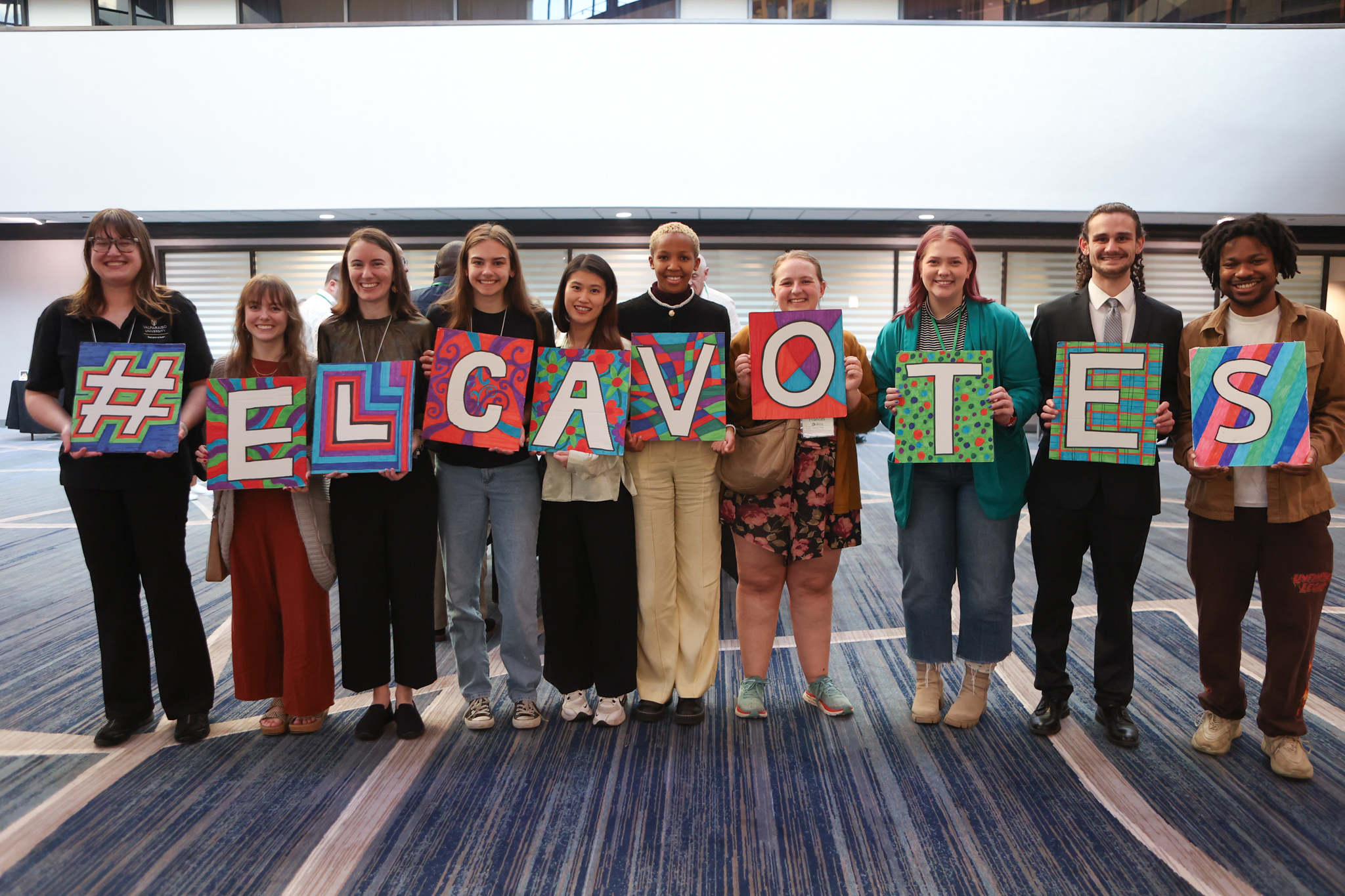
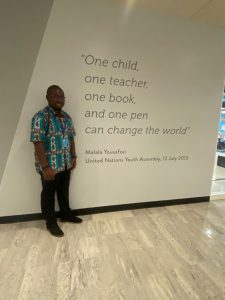
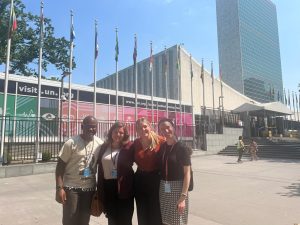
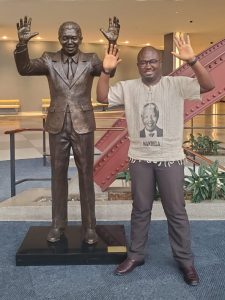
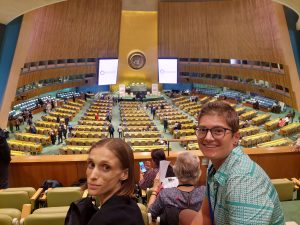
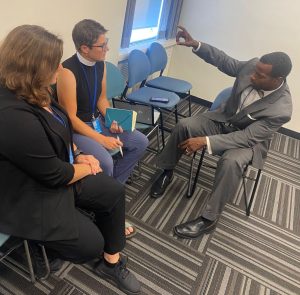
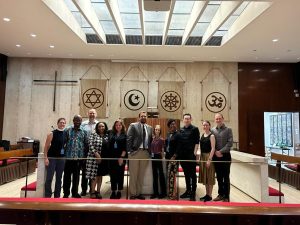 This week, four leaders from across the United States joined ELCA World Hunger and the
This week, four leaders from across the United States joined ELCA World Hunger and the 